Every few years a multiplayer shooter rolls around that transcends my normal love affair with video games and becomes a true addiction. From Unreal Tournament 2004 to Warhawk, these games come to personify how I view that era of gaming. Like rings in a tree trunk, they serve as markers to remind me of years long past.
Syndicate is my latest addiction.
Syndicate is actually a remake of Bullfrog’s 1993 strategy game of the same name. Despite this, you would be forgiven for not being able to recognize the lineage. Gone in this Syndicate is the original’s conquer-the-world strategy gameplay. In its place stands the first-person shooter mechanics you would probably expect in this day and age. Refashioning a nearly 10 year old franchise into a modern day shooter might smack of creative bankruptcy to some. However, Syndicate still manages to blend an incredibly well-executed confluence of tried-and-true combat mechanics while still presenting enough of its own flavor to avoid an outbreak of the “yet another shooter” contagion.
The story is set in 2069 in a future owned and ruled by massive mega-corporations called — you guessed it — Syndicates. The Earth’s population has been segregated between those that can afford to be connected to the future-internet known as “The Datascape” and those that cannot. Those with these chips installed are consumers, and therefore considered viable citizens in the eyes of the Syndicates. Those without the chips are essentially locked out of modern society and forced to live in squalor.
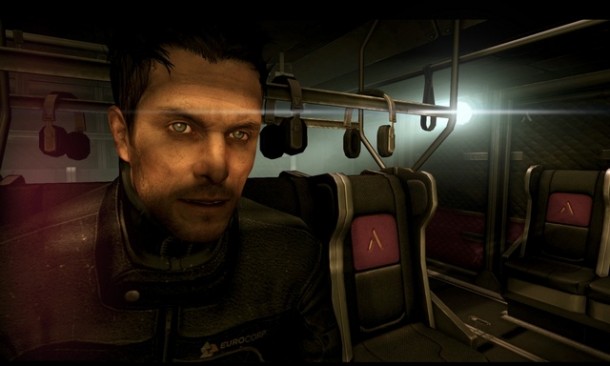
As the central protagonist Miles Kilo, you are an “agent” for Euorcorp, the world’s oldest and largest Syndicate. Rather than fight for the poor, degenerate masses inhabiting the “Down Zones,” you actually find yourself working for that most tried-and-true of authority archetypes, your employer. This means that your silent protagonist will be subjected to very little blind, video game ideology and sugary do-gooders. In fact, most of the primary characters are downright villainous — often psychopathic. In case you had any doubt just how bad these bad guys were, know that they are voiced with all of the relish you could expect by veterans Brian Cox and Michael Wincott. They do a great job of driving home the point that sometimes, people are just bad while Rosario Dawson provides a more human (and, in my opinion, slightly less interesting) warmth to the proceedings.
While Miles himself doesn’t exactly have much in the way of personality, he does have a prototype version of one of the company’s chips in his head. This DART chip basically gives him the ability to “breach” opponents and parts of the environment into doing whatever he wants them to and is the source of most of the game’s more unique trappings.
In the case of the futuristic rent-a-cops that players will most often find themselves pitted against, this means being able to blow up the guns in their hands, forcing them to commit suicide (often taking out a few of their buddies in the process) and persuading them to fight for your side for a limited time… and then committing suicide.
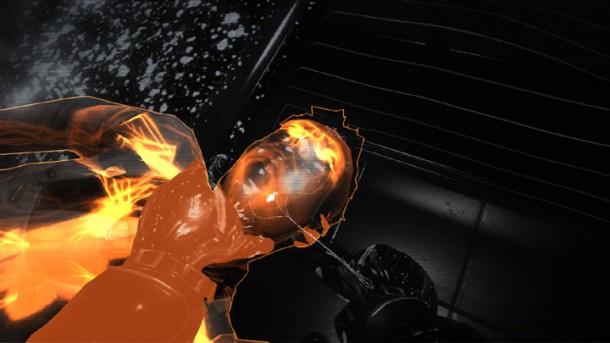
In the case of the game’s environment, which ranges from such cyberpunk stalwarts as high-tech office buildings, city slums and ocean-based fortresses, it usually means being able to add or remove retractable cover on the fly. This leads into the game’s cover system which, rather than requiring the player to lock into any specific location, is handled dynamically by Miles’ character model. If you just so happen to be taking refuge, crouched behind some low-lying bit of environmental flotsam, Miles will simply lean out of cover on the fly whenever you feel brave enough to take potshots at your enemies. It’s a really slick design that I can’t believe hasn’t been tried before.
And speaking of slick, Syndicate does an amazing job of maintaining a sense of agility. This is partially due to the Starbreeze’s dedication to –and knack for– the presentation in the first-person perspective. Miles’ character animations do a great job of grounding you within the world. For example, if you hit the crouch button while sprinting, Miles will begin a low slide-tackle that can carry you directly into cover. Other, less noticeable things like a more drawn-out sprint and the way that the character’s gun quarter-cocks while running not only look cool but deliver a sense of mobility that most modern shooters have forsaken in favor of the stop-and-pop method. Think of it like piloting a fighter jet instead of driving a tank; one might certainly look more durable and menacing but the other offers a far more exhilarating ride. And in case all of that speed gets to be too much for you, you can always activate “DART Vision” to slow things down and provide an X-ray view of the battlefield.
Even the guns in Syndicate seem as though they were designed with speed and smoothness in mind. Guns carry a decent amount of weight (particularly the mini-gun which, in my opinion, is the single greatest representative of its kind since Predator) but also feel sleek. The sniper rifle, for instance, comes with an alternate scope built into its side to facilitate close-range combat. The assault rifle features a semiautomatic firing mode that, when coupled with DART Vision, facilitates shooting enemies through cover. It’s almost as if your arsenal was designed to keep enemies from impeding your meteoric charge through the single-player campaign. This probably accounts, at least somewhat, for the compact campaign length. But you’ll hardly be bothered about that once you get into the game’s multiplayer.
Now, here’s where the real obsession sets in.
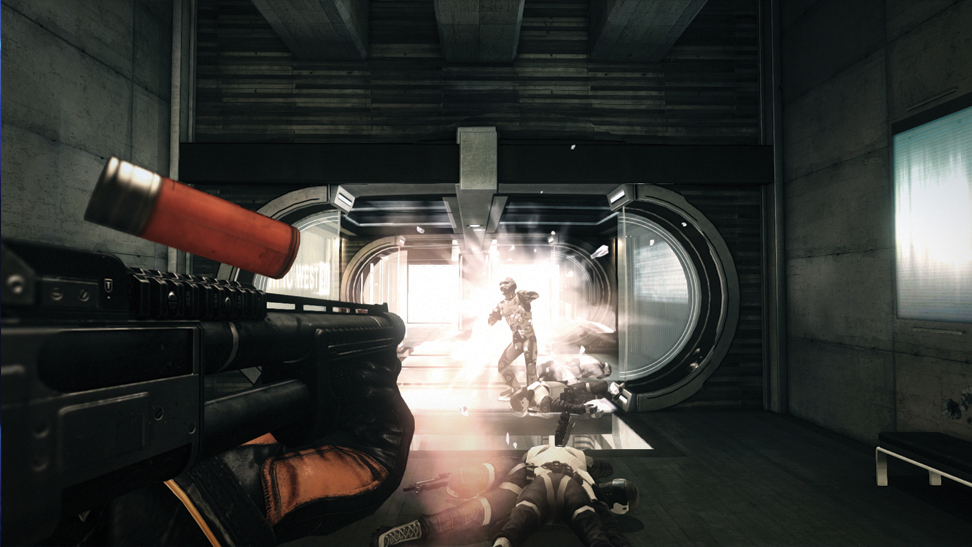
Syndicate actually doesn’t feature a competitive multiplayer suite like you might expect in just about any game released in the last five years. In its place is a four-player cooperative mode that takes cues from the original Bullfrog game.
Teams of players form their own, private Syndicates (clans, essentially) trot across the globe doing preset missions with their own objectives, bosses and set-pieces. In many ways they basically function like dungeon raids in MMO’s.
After you complete a level, you’re allotted a plethora of different currencies to spend on purchasing blueprints for weapon upgrades, skill enhancements, and unlocking new tiers of abilities. Once these have been unlocked, you actually have to set and queue them to be researched during matches with the experience you earn during these matches pouring into the various pools until the research is complete. Because there are so many different classifications of upgrades, and each of them requires experience from these missions, you feel a constant need to keep playing each mission over and over on different difficulties to unlock new levels and customizations. If you continue to play with the same group of friends, this constant playing and replaying of missions means that you develop your own unique set of team tactics and custom classes to tackle each mission more efficiently each time.
Syndicate has done what I never thought possible; it has created a ‘just one more time’ mentality in a first-person shooter.
Now here’s the bad news.
Frequent freezing during gameplay on the Xbox 360 version is a very serious issue. During my time with Syndicate, I experienced no fewer than six instances of this issue, requiring me to power down and reboot my system. According to the developer, the issue is caused by a clash between Xbox Live’s party system and the game’s own voice chat. Supposedly, it can be avoided by not using the party system at all. However, out of the six times my copy froze, four of those were during single-player, and only one occurred while I was in a party. These lock-ups didn’t really hamper my enjoyment of the game as much as they probably should have. This is a testament to how enjoyable Syndicate is when it does manage to work properly. Your own experience will depend on if and when Starbreeze resolves this issue. Currently, the developer has revealed no concrete plans to patch the bug.
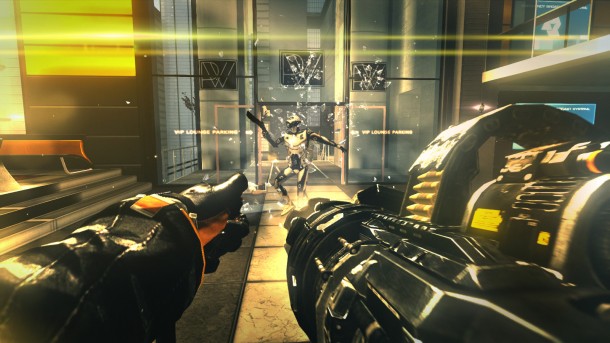
Aside from this, I really can’t say that I have many issues with Syndicate. A few throwaway platforming sequences don’t impress (but are more than made up for by one of my favorite train sequences in gaming history) and a lack of tutorials for the cooperative mode can be frustrating for the first few minutes.
Syndicate looks great, plays great and actually manages to tell a story worth taking the effort to pay attention to in a first-person shooter. Add to that boss fights that couldn’t have been plucked from the pages of a William Gibson novel and a multiplayer mode that, assuming I can keep my comrades interested, which doesn’t appear to be an issue, will likely have me coming back all year. It’s just a shame that such a great game has to be sullied by technical issues that — let’s face it – should not have been there at launch. Despite that, I have a feeling that Syndicate will be a game that I remember for a long, long time. Maybe I’ll bring it up while reviewing my next, great addiction.
This review is based on a copy of Syndicate purchased by the reviewer for the Xbox 360.

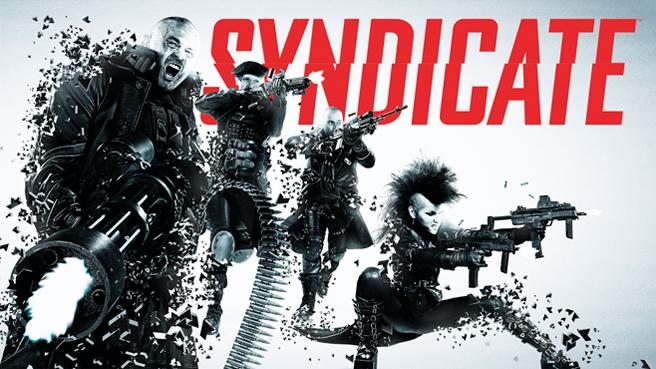
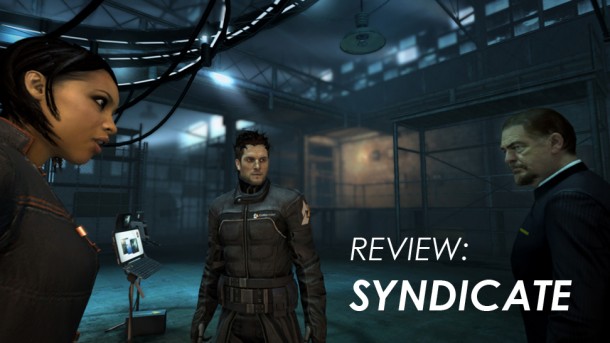
No Comments